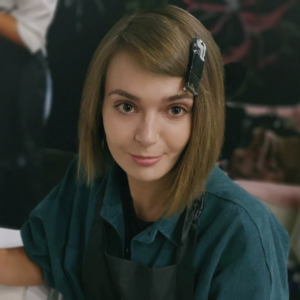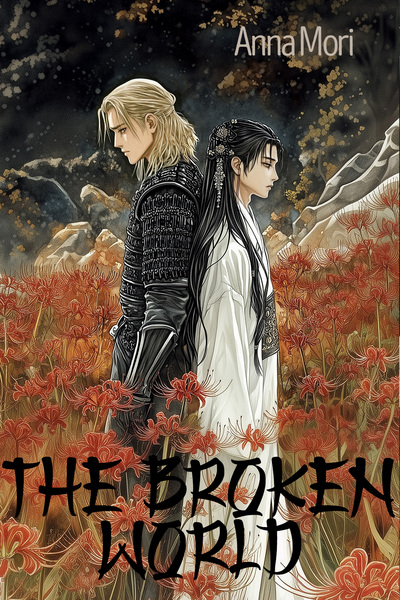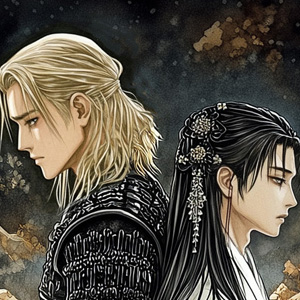He looked away, his voice unusually subdued as he asked, "I still don't understand why you're here."
"The owner of this shop is ill. His daughter, Momoko, is only seven, and she's struggling. She's looking after him while also trying to keep the business afloat. She asked me to watch the stall while she went to fetch medicine. How could I refuse? I think I'm doing a decent job of it."
"Does she know who you are?"
"Of course not. Do you know why I didn't try to abolish that ridiculous law requiring the Son of Heaven to hide his face? No one in this city knows what I look like. Even in the palace, only a handful of people do. That means I can go wherever I like, see how the city really lives, how the people truly fare. I see with my own eyes who works, who deserves reward or punishment. A few trusted people do the same. And the ministers know it. That's why their reports and financial statements haven't contained a single lie for years."
Gerel considered this. He had to admit, it made a certain sense.
"And how exactly do you evaluate the work of doctors, farmers, craftsmen?" he asked, his tone carrying a faint edge of mockery. He didn't mean to sound harsh, but neither did he plan to retract the words. What could this boy, raised in a gilded cage, truly know of the lives of ordinary people?
"I understand what you're getting at," Yukinari replied calmly. "I'll admit, there's much I don't know. But I'm not ashamed of that. I don't think it's beneath me to ask for advice from those who do. And sometimes, it's enough just to watch and listen. An honest merchant will be praised. A good doctor will lose fewer patients than a bad one."
Gerel shrugged noncommittally. It was far from as simple as Yukinari made it sound, but there was no denying the emperor's genuine interest in improving his country.
"And you don't find this humiliating?"
"What's humiliating about honest work?" Yukinari asked, looking genuinely puzzled.
Gerel doubted many rulers would agree with that sentiment. He tried to imagine Emperor Tokhung, back in Cheongju, dressed as a merchant, charming customers with flattering smiles. The thought was absurd. But Jin-ho? She might have managed it, though she'd surely tire of it quickly.
"I'd like to claim this was my own idea," Yukinari continued, "but no — it's said the legendary Di Huan did the same. She'd disguise herself as a commoner and walk the land, listening to her people."
"But isn't that dangerous?"
"I have people to protect me. Look closely — you'll see."
Indeed, Yukinari's bodyguards were nearby. They blended well, but Gerel's experienced eye picked them out easily: one pretending to browse sweets, another inspecting carnival masks, a third chatting with a sword-seller. They moved naturally, casually, but their focus never wavered from their emperor.
"Would you like to try being a merchant yourself?" Yukinari asked cheerfully.
"I..."
Would he? Stand beside Yukinari in this tiny shop, calling out to passersby, fixing hairpins into the coiffures of wealthy women with a foolish grin? Did he want to shed the mask, to look like any other man in the crowd — dark-eyed, black-haired, leading an ordinary, human life?
"No. I'm not much of a merchant," Gerel replied, his voice cool.
"Let's leave," Yukinari said suddenly.
"What?"
"Leave for Yuigui. I'll sell trinkets. You could open a school and teach military strategy. We could live as ordinary people. The war wouldn't touch us."
Had the emperor read his thoughts again?
"Oh, you're joking," Gerel said, his voice stiff.
Yukinari looked down at the floor.
"Of course I'm joking. But you... You could leave, if you wanted. I can't."
A scruffy little girl with a sharp, birdlike nose dashed into the shop. It had to be Momoko.
"Thank you, Master Yuki, for watching the shop!"
"It was nothing. How's your father?"
"He seems a bit better. I gave him his medicine. I want to make him ginger soup, too — it always helped me get better when Mama made it..."
"If you want, go ahead and make it now. I can tend the shop for a little longer."
"That would be amazing! Thank you so much! Have sales been good?"
Yukinari silently pulled a box of coins from under the counter and showed her the earnings.
"Whoa!" The girl's eyes went wide, more with alarm than delight. "That's... Did you rob someone?"
"I'd call it exactly that, Master Yuki," Gerel interjected with a sharp jab of sarcasm.
"Just say nice things to customers, Momoko — that's the secret. And always offer a discount."
"But if I give everyone a discount, I won't make any money..."
"Then start by naming a higher price than the one you actually want to sell for. If you know a comb is worth twenty coins, say, 'It costs thirty, but for you, I can let it go for twenty-five.' And always look at the customer's clothes first. If they're dressed well, you can ask for ten times the original price."
"Wow! I didn't know you could do that!" Momoko's face lit up with excitement.
"Every trade has its little tricks. The important thing is that everyone ends up satisfied, right? A buyer always knows how much they're willing to spend without hurting their purse," the emperor said serenely.
"Thank you, Master Yuki. I'll try to do what you said. But..." Momoko hesitated, her enthusiasm dimming with a sigh. "But I don't think I'll manage it anyway, because... well, you're you, and I'm just me. I mean, you're so handsome — it's no wonder people want to buy things from you. But I..."
"You're a silly one, Momoko," Yukinari said with a gentle smile. "You're very pretty. In five years, boys won't leave you alone. Actually, even now... Just wash your face, will you? When you become someone important, living in a palace, are you going to walk around all dirty like this?"
He tousled her hair affectionately. The girl laughed, closing her eyes and leaning into his hand like a kitten.
Yukinari glanced briefly at Gerel and then quickly looked away, but not before Gerel caught a flicker of embarrassment in his eyes.
Gerel felt a sudden pang of awkwardness himself. He recalled his earlier skepticism when Yukinari had spoken about preferring the life of a commoner over that of an emperor. Now he understood clearly: these trips to the city weren't a ridiculous spectacle to Yukinari. They were his sole escape. Even something as mundane as running a shop seemed to bring him genuine joy. In the palace, where every word and step was governed by rigid rules, the emperor couldn't afford the luxury of normal conversations with ordinary people.
Gerel found an odd symmetry between the emperor's unmasked face and the cat mask he himself wore. Yukinari, too, likely understood the desire to become someone else, to melt into the crowd, to vanish.
It was strange. At times, they seemed like the most different people imaginable. And at others, like twins.
Another thought struck Gerel: he had seen the emperor's face more often than his courtiers likely had. In just a few meetings, he might have come to know Yukinari better than they had in years.
Or perhaps Yukinari is simply trying very hard to convince me of that, Gerel thought, his mind darkening as he recalled his recent musings on the artificiality of everything in the Dragon Kingdom.
When Momoko left, Gerel said with biting irony, "Isn't she a little young for your harem?"
"What?"
"'Living in the palace.'"
"I wasn't talking about the harem," Yukinari replied coldly.
"Then what? You know as well as I do that in your country, being a girl from a poor district means a life sentence..."
Yukinari frowned. He raised a hand to his temple, as if collecting his thoughts, but said nothing and turned away.
"You seem to enjoy being good, don't you?" Gerel knew his words were cruel nonsense, but he couldn't stop. He had only ever learned to turn discomfort into arrogance, bitterness, and anger — there had been no one to teach him otherwise.
"I do enjoy being good," Yukinari replied finally. "What I don't understand is why some people enjoy being cruel so much... And no, it's not a life sentence." His voice softened, but his resolve was firm. "One day, I'll make that true. I'll make sure girls like Momoko can live with dignity. I promise you that."
The habit of writing letters to Tokhung began for Gerel in the year he lived in Yuigui. He disciplined himself to sit down at his desk and record the unusual events he had witnessed, if not every evening, then at least once every few days. In both the Land of the Tortoise and the Land of the Dragon, letters and journals were a favored pastime among aristocrats. These writings were less about conveying interesting news and more about competing in the elegance of prose and the poetry of comparisons. Unlike them, Gerel didn't concern himself with how well he wrote. To him, these letters — like reading books — were a necessity rather than a leisure. He knew that if he stopped dedicating time to it, he would begin to forget the hieroglyphs. Of course, he could have restricted himself to copying philosophical treatises, as students did at the Ling-tzu school, but making notes about his surroundings was far more engaging.
There was another reason as well: Gerel knew that when Tokhung received his letters, he would summon his family and courtiers and have them read aloud. Many would listen with genuine interest. Among the audience was often Jin-ho.
He favored one of the tea houses in the garden as a place to write his reports — a small space where no one disturbed him, especially in the early mornings or late evenings. At times, he grew weary of both his own people and Yukinari's courtiers and felt a need to be alone.
He settled on the veranda of the tea house, ground an inkstick on the inkstone, and began to write:
Greetings, my lord,
The negotiations are still far off, and it's impossible to predict their outcome. All that remains is to wait. I have accepted the Emperor's invitation to stay at his palace for a month.
Nearly everything in Shinju, the capital of Ryukoku, strikes me as unusual — and so there is much I wish to write about. Prepare yourself for a lengthy tale.
Unlike our country, which only recently gained access to the Inner Sea, Ryukoku has always been tied to the seas. It was fascinating to finally see seafaring vessels with my own eyes.
The people of Ryukoku consume a great deal of fish and manage to make even the most unappetizing-looking seafood taste delicious. Meat and bread, however, are nearly absent from their diet. There is no tradition of raising large livestock here — perhaps due to the country's mountainous terrain. But they do have horses.
Shinju boasts numerous temples — I've heard there are over a hundred. The people of Ryukoku, like those of other Middle Kingdoms, believe in the Four Gods. But whereas in Yuigui this idea has long ceased to be a religion in the usual sense and is better described as a philosophy, and our people in general have never been particularly religious, the residents of Ryukoku are devout to the point of naivety, resembling the tribes of the southern states — except that the latter also believe in a multitude of other deities and supernatural phenomena.
The Great Dragon is not merely a symbol to the people of Ryukoku but a very real — and all-powerful — being that governs human lives at its whim. The Emperor, along with all noble families, is regarded as a divine envoy, and even the educated classes are unwilling to abandon this belief.
Gerel paused after writing that the people of the Land of the Tiger were not religious. In truth, while most Cheongjuans relied more on their swords and bows than on divine guardians, Emperor Tokhung was exceptionally superstitious. He spared no effort or expense on expeditions to capture legendary creatures — all of which, naturally, returned empty-handed — and welcomed charlatans to his court, who spent years attempting to concoct an elixir of immortality from crane marrow, ground deer antlers, and similarly unappetizing ingredients. These elixirs were no more effective than kombucha — Tokhung aged slowly but inevitably. Gerel's brilliant military career in Cheongju was partly owed to the fact that the mysticism-obsessed emperor was among those who believed in Gerel's supernatural origins and deemed him an exceptional being... But criticizing Tokhung in a letter meant for his eyes would have been at the very least unwise.
The architecture of Ryukoku resembles that of Yuigui but is more refined and simultaneously more subdued. They elevate the patina of time and a certain delicate simplicity to an aesthetic principle, disdaining brilliance, novelty, and opulence. I dare to suggest that these principles arose because the country was impoverished for centuries.
I find myself constantly comparing Ryukoku to Yuigui, but it's difficult not to, as nearly everything here — from clothing to governance — has been borrowed from the Land of the Tortoise. However, I must admit that all the best aspects of our country were borrowed from there as well.
Despite these visible borrowings, the people of Ryukoku take immense pride in their culture and strive to emphasize its uniqueness.
And it truly is unique, graceful, and melancholic — a beauty of silence, shadow, and autumn, of decay and dying. Here, they have a tradition of not discarding broken cups but mending the cracks with gold or silver lacquer, and the entire culture of the Land of the Dragon is like that crack adorned with gold.











Comments (0)
See all